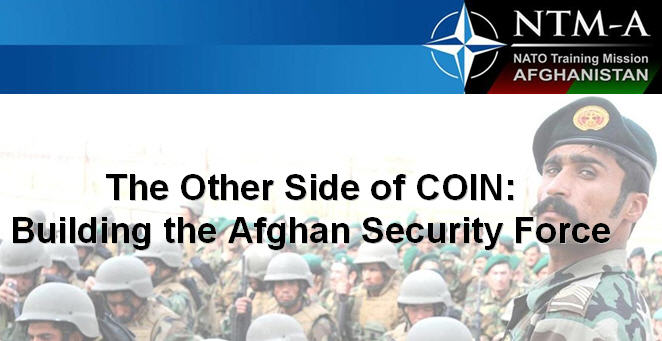
While most of the media attention to NATO’s Afghanistan operation has been on the kinetic operations, the war has no chance of ending successfully unless Afghans can provide their own security. Largely neglected until two years ago, that "other side of COIN" is showing promise.
Yesterday, the Atlantic Council hosted a delegation from NATO Training Mission – Afghanistan for a private discussion on "The Other Side of COIN: Building the Afghan Security Force." Derek Reveron, a Naval War College professor and regular contributor to New Atlanticist who is spending the year with NTM-A in his capacity as a Navy Reserve commander, led the presentation. His briefing slide is available in PowerPoint format (what else?) here, along with some supplemental materials.
Some key takeaways:
- The Afghan army has grown by 69% since the standup of NTM-A in November 2009.
- The mission is truly multi-national with 33 NATO Allies and Partners providing trainers (and 48 are providing forces for the training and/or kinetic missions). As US Army Colonel Keith Detwiler noted, no other organization has the capacity to successfully integrate such a diverse force. Additionally, some of the smaller partners are providing niche capabilities that the United States can not bring to the table. For example, the Afghan military is being equipped with some Soviet and other non-Western aircraft and equipment because it’s so much cheaper and therefore sustainable. The Hungarians are capable of training Afghan personnel on this aircraft, since it’s also in their inventory.
- The critical training is currently taking place in Turkey and the UAE rather than Afghanistan. Obviously, these places are more hospitable given their lack of ongoing insurgent activity. Additionally, there is a logistical need; these places have the facilities and infrastructure in place. It’s also politically convenient, in that NATO countries whose publics have turned against the fight in Afghanistan can much more easily send trainers to these countries. Over time, moving the training back inside Afghanistan will be necessary for sustainability.
- While the initial focus has been on training entry level soldiers and policemen, necessary to get a critical mass in place, it is now shifting to a "train the trainers" model. This includes not only officer academies and NCO development schools to instill professional ethics and technical and tactical competence but turning over the training of basic skills to Afghan leaders.
- Similarly, as the Afghan National Army gets more proficient at basic soldiering skills, the shift is on to training logisticians, intelligence analysts, and other advanced specialties needed as the transition to host nation leadership takes place.
- Literacy training is mandatory for all levels of police and soldiering. Two years ago, 86% of new recruits were illiterate. Aside from the obvious impairments that has to training and day-to-day duties, his made it next to impossible to do even simple tasks like paying soldiers. That’s slowly being corrected, with advancing levels of literacy and numeracy required for progressively higher levels within the force.
- Substantial effort is being made to have Afghans do more for themselves. For example, they’re now manufacturing most of their own uniforms, boots, blankets, and similar items. This not only substantially reduces the costs but indirectly fights the insurgency by providing sustainable employment for civilians.
While I remain highly skeptical that enough progress can be made against the Taliban for handover by 2014, I’m more confident than I was yesterday morning that we’re on the right track in training a professional security force in Afghanistan.
One point raised in the Q&A was the sustainability of the relatively costs of fielding such a large police and security force once the Afghans have to pay them themselves. Estimates put salaries alone at $4 billion annually. Considering that the United States alone is spending more than that ($6.7 billion) each month in Afghanistan, however, that seems a small price to pay for a stable Afghanistan even if the international community has to continue to pay most of it.
James Joyner is managing editor of the Atlantic Council.
Image: building-afghan-security-force.jpg
